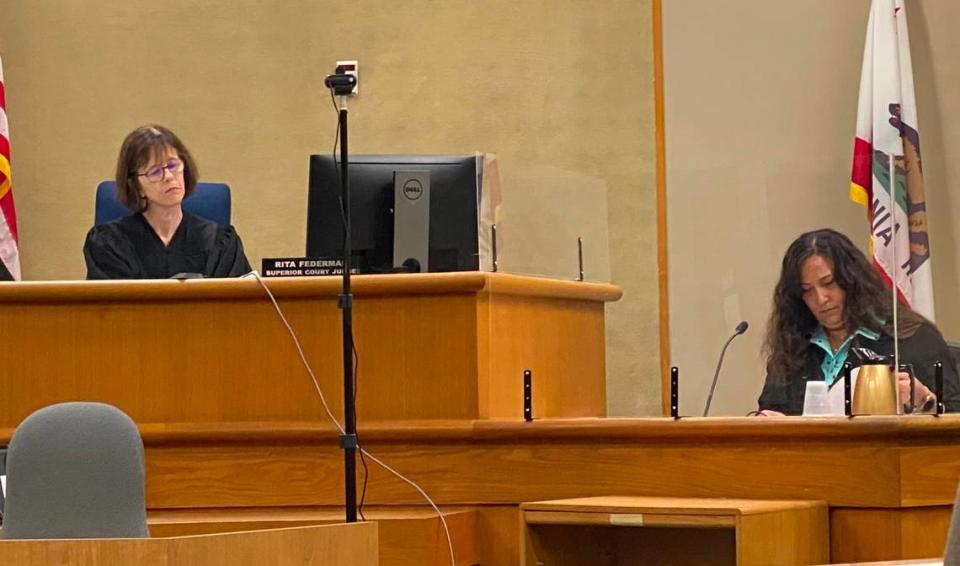Judge won’t reconsider ruling that SLO County overcharged for election recount
The woman who requested a ballot recount for the 2022 District 2 Board of Supervisors race still doesn’t owe the county extra money for the process, a judge decided.
The county originally charged San Miguel resident Darcia Stebbens $53,346.59 for requesting the recount.
In her January ruling, San Luis Obispo Superior Court Judge Rita Federman wrote that County Clerk-Recorder Elaina Cano did not adequately prove that $5,088 of “extended hours” worked by salaried employees were actual costs for the recount — and ordered that those costs be removed from Stebbens’ bill.
In February, the county submitted a motion in San Luis Obispo Superior Court asking Federman to reconsider her decision.
The county and Federman had one key disagreement: The county believed that any recount work performed by salaried employees within 80 hours of their two-week pay period were reimbursable costs, while Federman ruled that only 8 hours of work per weekday was reimbursable.
On Friday, Federman denied the county’s request to reconsider her decision and maintained that the $5,088 should be removed from the recount bill.
Stebbens said she was pleased with the decision.
“I appreciate that she was able to see that the citizens shouldn’t have to bear additional costs,” Stebbens told The Tribune on Wednesday.
Cano said she “respectfully disagrees” with Federman’s decision, but the county will not pursue further legal action related to this court case.
“It’s gone on long enough,” Cano said. “I am looking forward to moving forward and focusing on what I need to be focusing on — and that now is the general election.”
Judge denies new hearing in recount case
According to the California Code of Regulations, the person who requests a recount must cover all actual costs “that would not have been incurred but for the requester’s particular recount request,” including the election official’s staff hours.
When the District 2 recount ended, Stebbens refused to pay $4,448 of the recount bill. Cano sued in small claims court for the funds, and Stebbens was ordered to pay the balance.
Stebbens then appealed that decision. After three days of testimony, Federman ruled in her favor.
In her original decision, Federman disputed 50 hours worked by three employees outside of the regular 8-hour work day and on the weekend.
Cano proved that her office needed to work overtime to finish the recount “in a timely manner,” but she did not prove that it can be considered part of “actual costs” for the recount, Federman wrote in her decision.
Federman ordered the county to delete those hours from the bill.
The County Counsel’s Office, however, asked Federman to reconsider — arguing that the recount requester should cover “extended hours” worked by salaried staff.
According to county code, salaried employees “do not have defined working hours,” and are permitted to work a total of 80 hours during a two week period at any day or time, the motion said.
In her final decision filed on Friday, the judge denied the county’s motion — saying that she was not persuaded by its new arguments. Now, Stebbens will not have to pay her original outstanding balance of $4,448.
As of Thursday, it was unclear whether or not the county owed Stebbens the remaining $640 of the balance removed from the recount bill.

Stebbens, Cano react to the decision
Stebbens said she was pleased with Federman’s decision, though she would have preferred that more money was removed from her final bill.
Stebbens did not believe that she should be charged for any work performed by salaried staff — as the county had already budgeted for their paychecks.
“Those full-time salaried people were going to be paid regardless of if they were working on the recount,” Stebbens said. “From the beginning I think that they overcharged.”
Still, Stebbens was glad that Federman removed the $5,088 from the bill.
“I appreciate that she was willing to hear and affirm the citizens’ right to be able to have transparency into the elections process,” Stebbens said.
Cano, however, said she “respectfully disagrees” with Federman’s decision. Salaried staff are paid for two-week periods of work, and are authorized to work during any day or time, Cano said.
“As salaried employees, we have a little bit more flexibility with our schedule — we don’t just work Monday through Friday, eight hours a day,” Cano said, noting that she thinks extended hours should be reimbursed like other actual costs.
Cano said she conducted the recount in accordance with state law, which Federman acknowledged in her ruling.
In her original decision, Federman agreed with the county that Stebbens must pay for the hours worked by attorneys from the county counsel’s office, hours worked by recount board members and the benefits packages of employees who worked on the recount.
She also ruled the county provided Stebbens with all required relevant materials to review as part of the recount.
As a result, Cano said she will not change the way she conducts future recounts.

